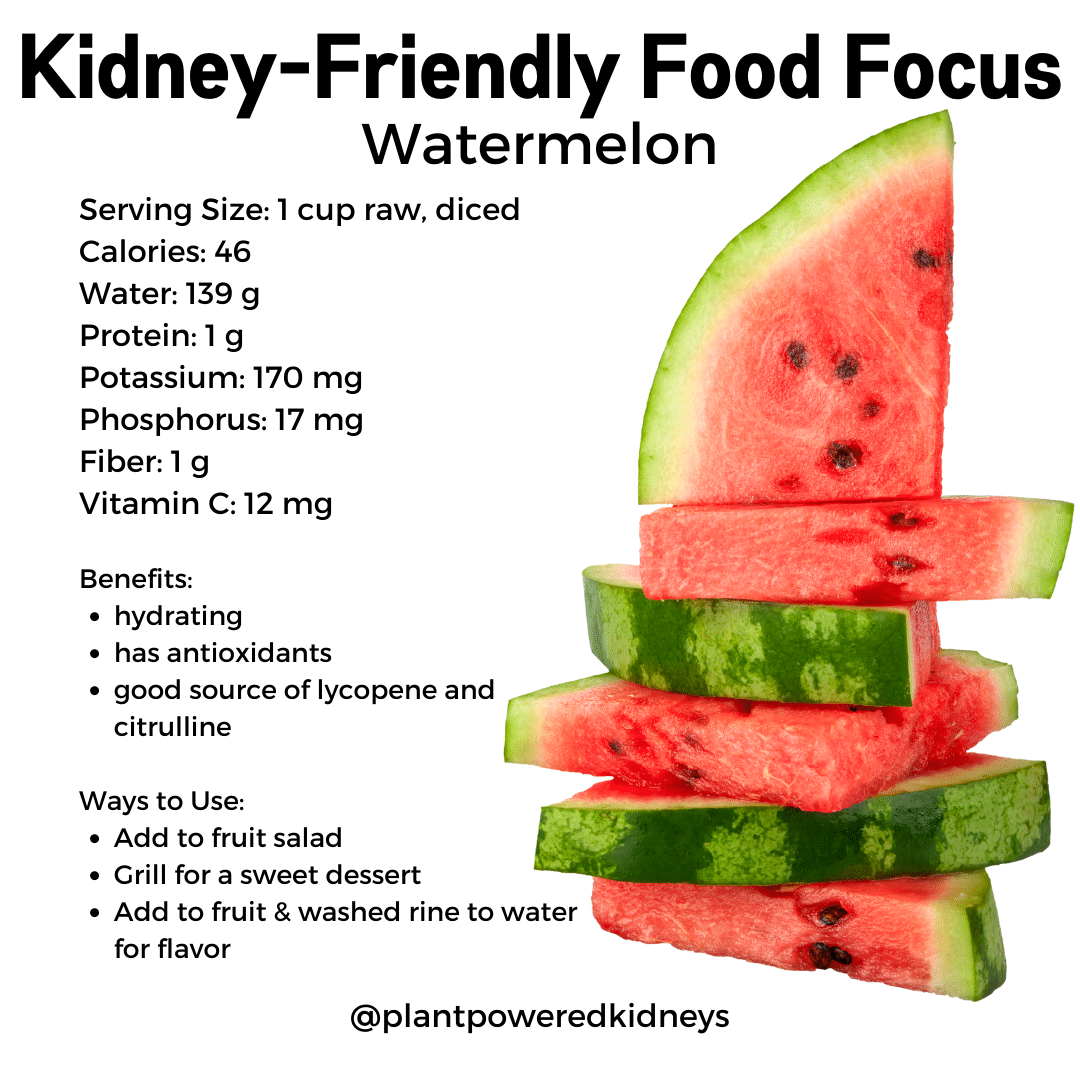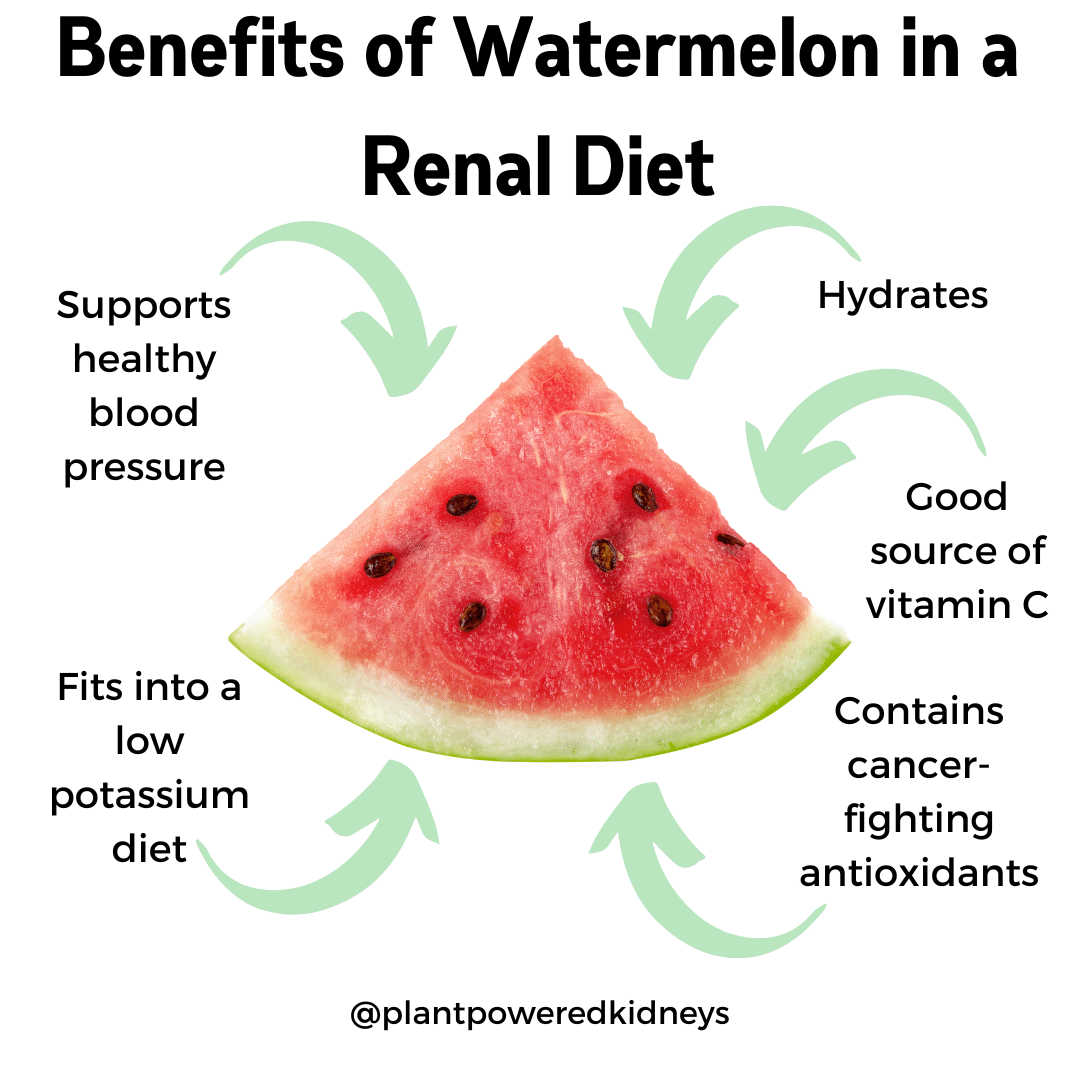When you think of summertime, what images come to mind? Sitting by the pool, enjoying a cookout with family and friends, cooling off in the shade. Chances are, a big, cold slice of watermelon is included somewhere in that image. But what about watermelon for kidney patients? Can watermelon be safely included in your kidney-friendly diet?
Chances are, yes. Watermelon is a nutrition powerhouse, filled with vitamins, minerals, antioxidants, and other nutrients that aid in your health. However, there are some instances where kidney patients may need to be cautious with the amount of watermelon included in their kidney-friendly diet. This article will cover everything you need to know about watermelon for kidney patients.

Table of Contents
Watermelon 101
Watermelons, also called Citrullus lanatus, are a fruit that is native to the Kalahari desert in Africa.
Watermelon is thought to have been first harvested about 5000 years ago. Now, it is produced in tropical places across the globe.
China is the top producer of watermelon in the world, followed by Turkey and India.
Belonging to the Cucurbitaceae family, watermelon consists of flesh, rind, and seeds. The flesh is what is most commonly eaten. However, all parts of a watermelon can be consumed.
Water and carbohydrates are what mainly makeup watermelon.
And yet watermelon also boasts plenty of vitamins, minerals, phytochemicals (plant chemicals), and antioxidants. Watermelon is mainly known for its high amounts of antioxidants citrulline and lycopene.
Watermelon Nutrition
So, what is actually in watermelon? Let’s look at the nutritional breakdown.
1 cup of raw, diced watermelon (152 grams in weight) has:
- Calories: 46
- Water: 139 grams (g)
- Carbs: 12 g
- Fiber: 1 g
- Sugar: 10 grams
- Protein: 1 g
- Phosphorus: 17 milligrams (mg)
- Potassium: 170 mg
- Vitamin C: 12 mg (14% of the DV)
- Magnesium: 15 mg (4% of the DV)
- Iron: <1 mg
Watermelon is naturally not a source of fat or sodium.
1 slice of watermelon also has 1 mg of oxalate. This is considered low oxalate.

What About Watermelon Juice?
Ideally, we like to include whole fruit. The whole fruit often has more of the vitamins and minerals intact (including fiber!).
However, let’s break down the nutritional content of watermelon juice:
A four-ounce glass of 100% watermelon juice has:
- Calories: 36
- Water: 110 g
- Protein: 1 g
- Fiber: <1 g
- Phosphorus: 13 mg
- Potassium: 135 mg
- Vitamin C: 10 mg
- Iron: <1 mg
While watermelon juice does contain some nutrition, we really want to include the whole fruit as much as we can.
If you’d like to enjoy some watermelon juice, try using these tips:
- Pair with a balanced meal or snack to curb blood sugars
- Keep to 4 ounces or less per day of all types of juice
- Add 1 or 2 ounces to sparkling or flat water for a flavor boost
This way we can truly reap all of the many benefits that watermelon has to offer.
Benefits of Watermelon
Besides including all of these great nutrients, watermelon has great benefits that can help kidney patients. Let’s dive into some of the benefits.
Hydration
As mentioned, watermelon is largely made of water. In fact, it’s about 92% water.
This means eating watermelon also equates to getting more water in. This is very important for kidney patients that have been directed to drink more water.
Better Blood Pressure
Citrulline, also known as L-Citrulline, is an amino acid. It has long been associated with antioxidant and vasodilation properties.
This means that it can help keep our cells and heart healthy.
The citrulline content is watermelon’s claim to fame. Watermelon is one of the best dietary sources of citrulline available.
Citrulline can help make arginine, another amino acid. Our body can create a substance called nitric oxide (NO) from these two amino acids.
Nitric oxide can help open and relax our blood vessels. This is called vasodilation. This process can help lower blood pressure.
Not having enough nitric oxide available in the body may contribute to poor blood flow and increased risk of high blood pressure as well as other heart problems.
Since watermelon contains a high amount of citrulline, including it in your diet can be a good way to increase your body’s nitric oxide.
Why is this important for your kidneys?
The heart and kidneys are two organs that work together in our bodies.
Having high blood pressure can damage your kidneys. On the other hand, if your kidneys aren’t working well, it can make it harder to manage blood pressure.
Including more foods that help control blood pressure can be a great way to care for your kidneys!
We still need more research to truly understand the connection between watermelon and blood pressure.
However, if you are struggling with blood pressure control, talk to your dietitian about how watermelon can fit into your diet.

Cancer Protection
As mentioned above, watermelon is packed with great antioxidants. Antioxidants can help in many ways, preventing illnesses and protecting the body and cells from damage.
Do you ever wonder where the distinct, beautiful reddish-pink color in the watermelon flesh comes from? Lycopene is the answer.
For a while, tomatoes were what we normally associated with lycopene. Yes, it’s true, tomatoes are a good source of lycopene. However, watermelon is too.
Lycopene is a type of carotenoid. It is an antioxidant, which means that it can help prevent damage to our cells.
1 cup of raw watermelon contains approximately 4530 µg of lycopene.
The antioxidant activity of the lycopene found in watermelon has many promising health benefits.
Diets that are high in lycopene may be protective against certain types of cancers, particularly prostate and colorectal cancers.
Blood Sugar Support
Lycopene has been associated with reducing high blood sugar.
However, we will discuss later in the article how this is an example of multiple factors and considerations when it comes to nutrients and health associations.
Heart Health
Besides blood pressure, watermelon may also be helpful for better heart health. This is again thanks to the lycopene.
This powerful antioxidant can help decrease inflammation and protect against cell damage. Inflammation and cell damage are both risk factors for cardiovascular disease.
Possible Better Sleep & Brain Health
There are also studies that suggest that lycopene in the diet can help improve sleep hygiene. It may also be protective against certain neurological (brain) diseases like Alzheimer’s disease.
More research is needed to determine these outcomes.
Possible Prevention Against Macular Degeneration
Another potential benefit of including watermelon for kidney patients is in eye health.
Lycopene has also been associated with potentially decreasing inflammation in the eyes. Again, more research needs to be done to support this concept.
Possible Lower Inflammation
Low levels of lycopene have been associated with inflammation. Inflammation can make it more difficult for the kidneys to function well.
The antioxidants of watermelon like lycopene and vitamin C may lower inflammation in the body.
However, we need more research to prove these claims.
Risks of Watermelon for Kidney Patients
Watermelon has many benefits for kidney patients. However, there are a few things to watch out for.
Fluid
As mentioned, watermelon is a great way to stay hydrated because it has a high water content.
However, some people with kidney disease need to follow a fluid restriction. The water that you drink needs to be factored into your daily fluid intake, but so does the water from your foods.
1 cup of raw, diced watermelon has 139 grams of water. One gram of water equals one milliliter of water.
Therefore, a cup of raw, diced watermelon has 137 mL of fluids, or just over a half-cup. For reference, an 8-ounce cup of water is 240 milliliters.
Talk with your dietitian about how watermelon can fit into your daily fluid needs.
Potassium
Watermelon contains potassium. Some people with kidney disease may need to limit the amount of potassium that they get from their diet.
If you do need to follow a low-potassium diet, be mindful of the portion size of a watermelon that you include.
1 cup of raw, diced watermelon contains 170 mg of potassium. This is considered a lower potassium serving.
However, it can be easy to eat much more than just 1 cup of watermelon.
Eating two cups of watermelon contains 340 mg of potassium. This is considered a higher potassium item.
Remember, not everyone with kidney disease needs to follow a low-potassium diet. Be sure to talk to your doctor and dietitian about how much potassium is safe for you.
Talk with your dietitian about how much watermelon you can include in your kidney-friendly diet.
To learn more about the low potassium diet, click here.
Blood Sugars & Diabetes
You’re likely thinking about the sugars in watermelon if you are one of the millions of people with both kidney disease and diabetes.
Again, it comes down to portion size. 1 cup of raw, diced watermelon contains 12 grams of carbohydrates.
Of the total carbohydrates, 9 grams are of natural, total sugars.
Watermelon only contains 1 gram of fiber in 1 cup of diced watermelon. The fiber found in fruit is what helps keep blood sugars under control.
You may need to talk with your dietitian about how much watermelon can be safe to enjoy.
Also, be sure to ask what foods you can eat with watermelon for better blood sugar control.
Watermelon can definitely fit into a renal diabetic diet. However, you may just need to work with your dietitian to determine how to include it to be mindful of your blood sugars.
Learn more about the renal diabetic diet here.
How Kidney Patients Can Enjoy Watermelon
Now that we’ve covered the nutrition information, pros, and cons about watermelon, let’s talk about how you can add watermelon to your renal diet.
Fresh
Watermelon is delicious on its own. You can slice a watermelon into cubes, triangle-like slices, or scoop out parts of the flesh with a watermelon scooper.
Any bacteria present on the outside of the rind can be “pushed” into the melon when cutting it. Salmonella has been associated with canteloupe, honeydew, and yes, watermelon.
Therefore, be sure to thoroughly wash the outside of the watermelon with soap and water before cutting it.
This classic summer treat can be enjoyed any time of the day but can be a refreshing afternoon treat or after-meal dessert.
Watermelon Fruit Salad
Try watermelon in a fruit salad. Slice your watermelon into 1-inch cubes or scoop out into 1-inch balls and pick 2-3 other fruits to combine with.
For example, combine pineapple chunks, watermelon cubes, blueberries, and kiwi with a squeeze of lime juice to taste.
Sprinkle a few tablespoons of chia seeds into the salad to give it an extra boost of fiber and plant protein. Plus, the chia seeds will absorb the fruit juices. This can help keep the salad from getting too “liquidy.”
A fruit salad like this will keep for just a couple of days in the fridge – so enjoy quickly. Share with others as it can be made into a large dish, great for potlucks and picnics. This is an easy and delicious summer salad.
Easy Homemade Watermelon Sorbet
In the mood for a sweet treat? Try this watermelon sorbet recipe! Cut watermelon into chunks and freeze.
Once completely frozen, add to a blender or food processor with some lime juice to taste. Voila! An easy watermelon sorbet.
To cut down on added sugar, skip the sweetener option!
Watermelon Popsicles
Have some popsicle molds handy? Try a homemade watermelon popsicle.
Just blend fresh watermelon and some lime juice and pour into your popsicle molds. Freeze overnight and enjoy the next day.
You can get creative with your watermelon pops! Blend your watermelon with mint or rosemary to add some more flavor.
Watermelon Rind Water
Save those watermelon rinds! Add the rinds (with a little bit of red) to a large pitcher. Fill with fresh water and allow to infuse for a few hours or overnight.
Add some fresh mint sprigs for extra fresh flavor.
This watermelon water is a great option to serve at parties to help everyone stay hydrated and enjoy drinking water.

Summary
So, what is the 411 on watermelon for kidney patients? The short answer is that watermelon can certainly fit into your kidney-friendly diet.
In fact, watermelon can be helpful in reducing inflammation and keeping our cells safe and healthy.
Watermelon is also a good source of citrulline and lycopene, which may help with better heart health and blood pressure.
If you have a potassium restriction or need to follow a fluid restriction you may need to be mindful of the portion size of watermelon that you eat.
Additionally, if you have diabetes and need to manage your blood sugars, talk with your dietitian about healthy ways to include watermelon in your diet.
Overall, watermelon can be a refreshing treat this summer and has lots of kidney-friendly benefits. Enjoy!


